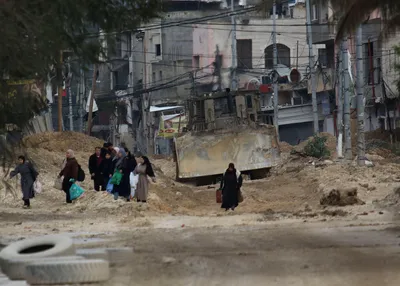Aida Camp: ‘No escape’ from Israel’s indiscriminate use of tear gas

Tear gas is a chemical irritant which causes burning sensations on the skin and eyes, which is frequently used as a used as a “crowd control” weapon by Israeli security forces. A report by academics from the University of California, Berkley in the US, No Safe Space: Health consequences of tear gas exposure among Palestine refugees has found that 100% of the population of Aida, a refugee camp in the West Bank, have been exposed to the substance in the last year.
Their findings underline a statement made to the UN General Assembly by UNRWA Commissioner-General Pierre Krähenbühl in November that Palestinians living in Aida camp are “exposed to more tear gas than any other population surveyed globally”.
Aida camp is densely-populated, with approximately 6,400 people inhabiting just 0.071km of narrow streets and small apartments. In interviews with residents, researchers found that tear gas exposure in the camp was “widespread, frequent and indiscriminate” and that there were “no safe spaces” to escape its effects. This in turn means that “everyone from babies to the elderly, the vast majority of whom had no role in stone throwing or clashes” are affected. The residents surveyed alleged that the use of teargas by Israeli forces is “primarily unprovoked” and not correlated with political tensions, protests or specific security incidents. The authors contend that the use of tear gas in refugee camps “appears to go well beyond any appropriate use”.
Physical health effects
Among the surveyed population, tear gas exposure was associated with acute symptoms of breathing difficulties, loss of consciousness, skin rashes and severe pain. In the longer-term residents reported asthma, skin complaints, chronic headaches and even miscarriages as a result of tear gas. Nearly a quarter of those surveyed (22.5%) said that they had been directly hit by a tear gas canister in the past. Such incidents have caused severe injuries and even deaths among Palestinians across the oPt.
These findings are consistent with international studies which have found health impacts of tear gas exposure to include “injuries from the canisters, skin burns, chronic eye damage, and significant injury to the lungs and other mucosa.”
Nearly a quarter of residents (23.6%) reported having sought medical attention because of exposure to tear gas, however when speaking to health workers the researchers found that the provision of healthcare is affected by the actions of the Israeli security forces. Health workers raised concerns about Israeli raids on hospitals and confiscation of medical records which undermine patient privacy and health-seeking behaviours, meaning that medics refuse to keep records on “violence cases” in order to protect their patients. Medics also reported instances of tear gas being fired directly at ambulances or those seeking medical treatment.
Mental health effects
Tear gas exposure was also found to be associated with poorer mental health and general wellbeing, with consistent reports of fear, hyper-arousal, disrupted sleep and feelings of lack of safety, exacerbated by the frequency and unpredictability of Israeli forces’ raids in the camp. The authors found “a pattern and level of distress consistent with high levels of anxiety and depression, including: sleep disruption, acute stress responses, and chronic post-traumatic stress disorder,” and that “no group was exempt from this pattern … [suggesting] that in addition to individual levels of distress, that there is a level of community distress that pervades the camps.”
These findings are consistent with MAP’s Health Under Occupation report, released last year, which highlighted how daily experiences of life under occupation affect the mental health of Palestinians. In addition to tear gas exposure and regular contact with a foreign occupying military force, constant restrictions on free movement as a result of checkpoints and barriers, harassment by settlers and demolitions of homes and livelihoods all feed pervasive experiences of humiliation and personal insecurity, and in turn undermine quality of life.
Protecting residents: Israel’s responsibility
The authors of the No Safe Space report make clear recommendations for how the health and wellbeing of Palestinians can be protected, reminding Israel that “the primary responsibility for protecting Palestinian civilians in occupied territory and ensuring their welfare is with Israel, the occupying power,” and that “all Palestinians living in the occupied areas are considered protected persons under international law.”
They recommend that the State of Israel ensure that security forces adhere to international guidelines on proportionate use of force and commit to “respect and protect human dignity and uphold the human rights of all persons.” They urge Israel to avoid the use of tear gas in ways which may increase risk of injury and death, including firing canisters directly at people and using tear gas in confined areas where people cannot escape their effects, included crowded refugee camps.
Echoing MAP’s calls for the protection of medical staff and facilities, the authors also urge Israel to “respect international standards on medical ethics and patient privacy, including as laid forth in customary international human rights and humanitarian law” and to “prevent forces from entering or occupying hospitals or other health facilities, or violating patient privacy by confiscating medical records or attempting to interview health care workers regarding patients under their care.”
On 23 January 2018, Israel will undergo the third Universal Periodic Review of its human rights record at the UN Human Rights Council in Geneva. You can help call for the UK Government to raise the protection of Palestinian health and healthcare by taking action today.
Related content


